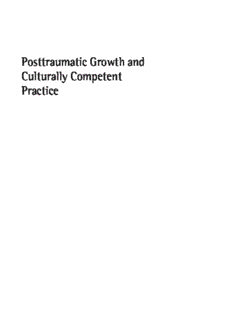Table Of ContentPosttraumatic Growth and
Culturally Competent
Practice
Posttraumatic Growth and
Culturally Competent
Practice
Lessons Learned from
Around the Globe
Edited by
Tzipi Weiss and Roni Berger
John Wiley & Sons, Inc.
Thisbookisprintedonacid-freepaper.(cid:2)1
Copyright#2010byJohnWiley&Sons,Inc.Allrightsreserved.
PublishedbyJohnWiley&Sons,Inc.,Hoboken,NewJersey.
PublishedsimultaneouslyinCanada.
Nopartofthispublicationmaybereproduced,storedinaretrievalsystem,ortransmittedinanyformorbyany
means,electronic,mechanical,photocopying,recording,scanning,orotherwise,exceptaspermittedunderSection
107or108ofthe1976UnitedStatesCopyrightAct,withouteitherthepriorwrittenpermissionofthePublisher,
orauthorizationthroughpaymentoftheappropriateper-copyfeetotheCopyrightClearanceCenter,Inc.,222
RosewoodDrive,Danvers,MA01923,(978)750-8400,fax(978)646-8600,oronthewebatwww.copyright
.com.RequeststothePublisherforpermissionshouldbeaddressedtothePermissionsDepartment,JohnWiley&
Sons,Inc.,111RiverStreet,Hoboken,NJ07030,(201)748-6011,fax(201)748-6008.
LimitofLiability/DisclaimerofWarranty:Whilethepublisherandauthorhaveusedtheirbesteffortsinpreparing
thisbook,theymakenorepresentationsorwarrantieswithrespecttotheaccuracyorcompletenessofthecontents
ofthisbookandspecificallydisclaimanyimpliedwarrantiesofmerchantabilityorfitnessforaparticularpurpose.
Nowarrantymaybecreatedorextendedbysalesrepresentativesorwrittensalesmaterials.Theadviceand
strategiescontainedhereinmaynotbesuitableforyoursituation.Youshouldconsultwithaprofessionalwhere
appropriate.Neitherthepublishernorauthorshallbeliableforanylossofprofitoranyothercommercial
damages,includingbutnotlimitedtospecial,incidental,consequential,orotherdamages.
Thispublicationisdesignedtoprovideaccurateandauthoritativeinformationinregardtothesubjectmatter
covered.Itissoldwiththeunderstandingthatthepublisherisnotengagedinrenderingprofessionalservices.If
legal,accounting,medical,psychological,oranyotherexpertassistanceisrequired,theservicesofacompetent
professionalpersonshouldbesought.
Designationsusedbycompaniestodistinguishtheirproductsareoftenclaimedastrademarks.Inallinstances
whereJohnWiley&Sons,Inc.isawareofaclaim,theproductnamesappearininitialcapitalorallcapitalletters.
Readers,however,shouldcontacttheappropriatecompaniesformorecompleteinformationregardingtrademarks
andregistration.
Forgeneralinformationonourotherproductsandservices,pleasecontactourCustomerCareDepartmentwithin
theU.S.at(800)762-2974,outsidetheUnitedStatesat(317)572-3993orfax(317)572-4002.
Wileyalsopublishesitsbooksinavarietyofelectronicformats.Somecontentthatappearsinprintmaynotbe
availableinelectronicbooks.FormoreinformationaboutWileyproducts,visitourwebsiteatwww.wiley.com.
LibraryofCongressCataloging-in-PublicationData:
Posttraumaticgrowthandculturallycompetentpractice:lessonslearnedfromaroundtheglobe/editedbyTzipi
WeissandRoniBerger.
p.cm.
Includesindex.
ISBN978-0-470-35802-3(pbk.)
1. Lifechangeevents—Cross-culturalstudies. 2. Psychictrauma—Cross-culturalstudies. 3. Disasters—
Psychologicalaspects—Cross-culturalstudies. I. Weiss,Tzipi. II. Berger,Roni.
BF637.L53P672010
155.9035–dc22
2009035906
PrintedintheUnitedStatesofAmerica
10 9 8 7 6 5 4 3 2 1
ToAri,Bob,Dan,George,
andTamiwhoalwayshelpusgrow.
Contents
Foreword, ix
AbouttheEditors, xi
AbouttheContributors, xiii
Acknowledgements, xix
Introduction, xxi
Chapter1 ThePosttraumaticGrowthModel:Sociocultural
Considerations, 1
LawrenceG.Calhoun,ArnieCann,and
RichardG.Tedeschi
Chapter2 PosttraumaticGrowthinIsraeliJews, 15
AvitalLauferandZahavaSolomon
Chapter3 PosttraumaticGrowthinMiddleEasternContext:Expression
anddeterminantsamongPalestinians, 31
Raija-LeenaPunam€aki
Chapter4 PosttraumaticGrowthintheTurkishPopulation, 49
CengizKilic¸
viii Contents
Chapter5 ThrivinginPostwarKosova, 65
AlirizaAr€enliuandMosheS.Landsman
Chapter6 TraumaandPosttraumaticGrowthinGermany, 73
BirgitWagnerandAndreasMaercker
Chapter7 PosttraumaticGrowthintheNetherlands, 85
GrietekePool,MirjamJ.Nijdam,&MarijkeE.Oostingh
Chapter8 PosttraumaticGrowthinSpain, 97
CarmeloV(cid:2)azquezandDarı´oP(cid:2)aez
Chapter9 PosttraumaticGrowthinU.S.Latinos, 113
RoniBergerandTzipiWeiss
Chapter10 PosttraumaticGrowthinJapan:APathtowardBetter
UnderstandingofCulture-ConstantandCulture-Specific
Aspects, 129
KanakoTaku
Chapter11 PosttraumaticGrowthinChineseCulture, 147
SamuelM.Y.HoandYuBai
Chapter12 PosttraumaticGrowthinAustralianPopulations, 157
JaneShakespeare-FinchandBronwynMorris
Chapter13 PosttraumaticGrowthinInternationalStudy:TheCaseof
ChineseinAustralia, 173
ThomasA.WhelanandWinifredA.Cunningham
Chapter14 PosttraumaticGrowthAroundtheGlobe:ResearchFindings
andPracticeImplications, 189
TzipiWeissandRoniBerger
AuthorIndex, 197
SubjectIndex, 207
Foreword
TRAUMA LESSONS MORE OFTEN THAN TRAUMA LOSSES
TheemergingconceptofPTGisakindofsalvetothehurtingsoulofthetraumatized.Most
peoplehavenounwantedconsequencesoftraumaexposureandmanygainvaluablelessons.
This is in contrast to the many years of PTSD research, which focused on the negative
consequences. What is emerging in the current century is a growing recognition and
appreciationoftheresilienceofthehumanspirit,despitetheimpactofmajorcatastrophes
suchastherecentbushfiresinVictoria, Australia,theIndianOceantsunami,theterrorist
attacksinNewYorkandWashington,DC,andHurricaneKatrinaandtheleveefailuresin
the U.S.
RichardTedeschiandLawrenceCalhounin1995introducedthetermPTGasawayof
representingreportsandlaterresearchfindingsaboutthebeneficialeffectsofthestrugglewith
traumaticevents.Thisisthelatestbooktotaptheexperiencesofresearchersandpractitioners
around the world who have found the presence of PTG; that there are gems of good news
amongthesadanddepressingstoriesofthetraumatized.ItistotheircreditthatPTGisnow
partoftheassessmentsandtheoriesmostutilizedbythosehelpingthetraumatized.
Tzipi Weiss and Roni Berger’s Posttraumatic Growth and Culturally Competent
Practice: Lessons Learned from Around the Globe brings welcomed attention to applying
PTGtoculturallycompetentpracticeworldwide.Theydeliverontheirpromiseimbeddedin
their title: Lots of lessons within the fourteen chapters.
ThefirstchapteriswrittenbythefoundingfathersofPTG(Calhoun&Tedeschi)with
thehelpofArnieCann.TogethertheysuggestthatPTGresearchersandpractitionersmust
adoptamoresociocultural/contextualorientationforbothmeasuringandpredictingPTG.
Their new model suggests that the active ingredient in understanding thriving among the
traumatized is, among other things, the critically important indicator of resilience and
thriving as the meaning making ingredient that is embedded within survivors’ culture.
x Foreword
Theotherchaptersfocusonwidelydivergentculturesandtheapplicationofculturally
competentpracticesrelatedtoPTG.TheyincludeIsraeliJews,Palestinians,thoseinTurkey,
Kosovo, the Germans, the Dutch, Spaniards, U.S. Latinos, Japanese, Australians, and the
Chinese-Australians.
Inthefinalchaptertheeditorscallforresearchthatcanfurtherdeveloptheconceptof
PTGandhowbesttoapplythesefindingstowardpromotingthrivingandhumandevelop-
ment.ThisiseasiersaidthandonebecausePTGis,inessence,are-framingofreality.When
does re-framing become self delusion? To be blunt, when does PTG become a problem of
perspectiveandreality?SomearguethatPTGisoftenatemporarydraftofmeaningmaking;
thatlaterdraftsarefarmorerealistic.Whatisimportant,accordingtofundamentalmodels
ofhumandevelopment,isstability,lowstress,andifthereisstress,waysofreturningtothe
set point. PTG is an indication of a cognitive shift among the traumatized.
WeissandBerger,throughouttheirbook,remindusthatPTGisarepresentationofthe
societal values of the culture and the meaning making narratives they stimulate. Thus,
for example, the chapter on Spain includes reports of how the collectivistic culture
leads to a kind of ‘‘communal coping’’ via participation in political demonstrations.
While the chapters show diversity in the structure of PTG across cultures, the cultural
factorsarethenecessarybutnotsufficientingredientinaccountingfordifferencesthatoften
are affected by the interplay between culture and coping with adversity.
The reader will find that this book not only illustrates the expanding and culturally
sensitivenatureofPTG,butalsotheimportanceofculturallycompetentpracticegenerally.
This volume, through the editors and chapters authors’ contributions, challenges trauma
researcherstobemoreculturallycompetentintheirconceptualizing,planning,carryingout,
and reporting the findings of those outside their own culture.
Charles R. Figley, PhD
Kurzweg Chair in Disaster Mental Health
Tulane University (New Orleans, USA)
About the Editors
RoniBerger,PhD,LCSW,wasbornandraisedinIsrael.Dr.BergerholdsaBSW,MSW,and
PhD from the Hebrew University of Jerusalem and a Diploma in Psychotherapy from
Tel Aviv Medical School. She serves as a professor at Adelphi University, a consultant to
variousprofessionalorganizations,andmaintainsaprivatepractice.Herfieldsofexpertise
are immigrants; families, specifically stepfamilies; posttraumatic growth; qualitative re-
search; and group work. She published and presented extensively, nationally and interna-
tionally.PreviousbooksincludeStepfamilies:Amulti-dimensionalperspective,Immigrant
women tell their stories, and From custodialism to community: Transforming residential
settings(withH.W.Polsky).Dr.Bergerservesonnumerouseditorialandadvisoryboardsof
professionalorganizations.BeforeherimmigrationtotheUnitedStatesin1990,sheworked
inIsraelinacademia,indirectpracticewithindividuals,families,andgroupsinthefieldsof
healthandmentalhealth.Shealsoheldsupervisoryandadministrativepositionsindiverse
social,medical,andeducationalsettings.Dr.Bergerhasreceivedseveralawardsandgrants
and served as a Fulbright scholar at the City University of Hong Kong.
Tzipi Weiss, DSW,LCSW,is anassociateprofessoratLong Island University’sC.W. Post
DepartmentofSocialWorkandthedirectoroftheundergraduateprogram.Sheisaboard-
certifiedexpertintraumaticstress,anadvisertocommunityorganizations,andaclinicianin
private practice. She studied the biological, psychological, and social aspects of human
behavior and received a BA from Tel Aviv University, an MSc from Israel’s Institute of
TechnologyMedicalSchool,anMAfromColumbiaUniversityandMSWandDSWdegrees
from Adelphi University. She has worked in mental health agencies serving individuals,
families, and groups, specializing in gerontology, psycho-oncology, and bereavement. Her
researchintheareaofstressandcopinghasfocusedonposttraumaticgrowth,psychosocial
aspects of breast cancer, and immigration. Dr. Weiss has published book chapters and
articles in key professional journals, including Psycho-Oncology, The Journal of Psycho-
social Oncology, and the Journal of Social and Clinical Psychology. She has presented in
conferences in the United States and abroad.
About the Contributors
AlirizaAr€enliu,PhD,wasborninKosovaandreceivedhisdoctorateinclinicalpsychology
and psychotherapy at Ludwig Maximilians University in Munich, Germany. He currently
servesasalecturerattheDepartmentofPsychologyintheUniversityofPrishtinaandasa
coordinator of the World Health Organization’s community mental health services in
Prishtina, Kosova.
Yu Bai (Baiyu) was born and raised in Beijing, China. She holds a BA in biomedical
engineeringandaMPhilinpsychologyfromTsinghuaUniversityandisaPhDcandidateat
the University of Hong Kong. Her work has focused on group counseling for Internet-
addicted college students. Her current research is on positive psychotherapy for depressed
patients. In 2005, she was awarded MPhil dissertation at Tsinghua University, Beijing,
China.
ArnieCann,PhD,holdsaBSinbusinessadministrationfromNortheasternUniversityanda
doctorate in social psychology from Indiana University. He has served as a Professor of
Psychology at the University of North Carolina at Charlotte since 1975, where he teaches
undergraduate and graduate courses in social psychology and research methods. His
research focuses on the intersection of social and health psychology. He has published
on topics like posttraumatic growth, the roles of humor and humor styles in coping with
stress, and perceptions of individuals facing trauma, as well as gender stereotypes, gender
roles, and intimate relationship issues. In collaboration with Lawrence Calhoun, he has
conductedworkshopsoneffectiveusesofhumorforindividualsinhighstressoccupations.
Hehasservedonregionalandnationalexecutivecommitteesfororganizationspromoting
social psychology.
LawrenceG.Calhoun,PhD,isaprofessorofpsychologyattheUniversityofNorthCarolina
atCharlotteandalicensedclinicalpsychologist.AlthoughhisparentswereNorthAmerican,
hewasbornandraisedinBrazilbutcompletedbothhisundergraduateandgraduatestudies
Description:"Posttraumatic Growth and Culturally Competent Practice: Lessons Learned from Around the Globe brings welcome attention to applying PTG to culturally competent practice worldwide. It delivers on the promise embedded in its title: lots of lessons within the fourteen chapters." —From the Foreword by

